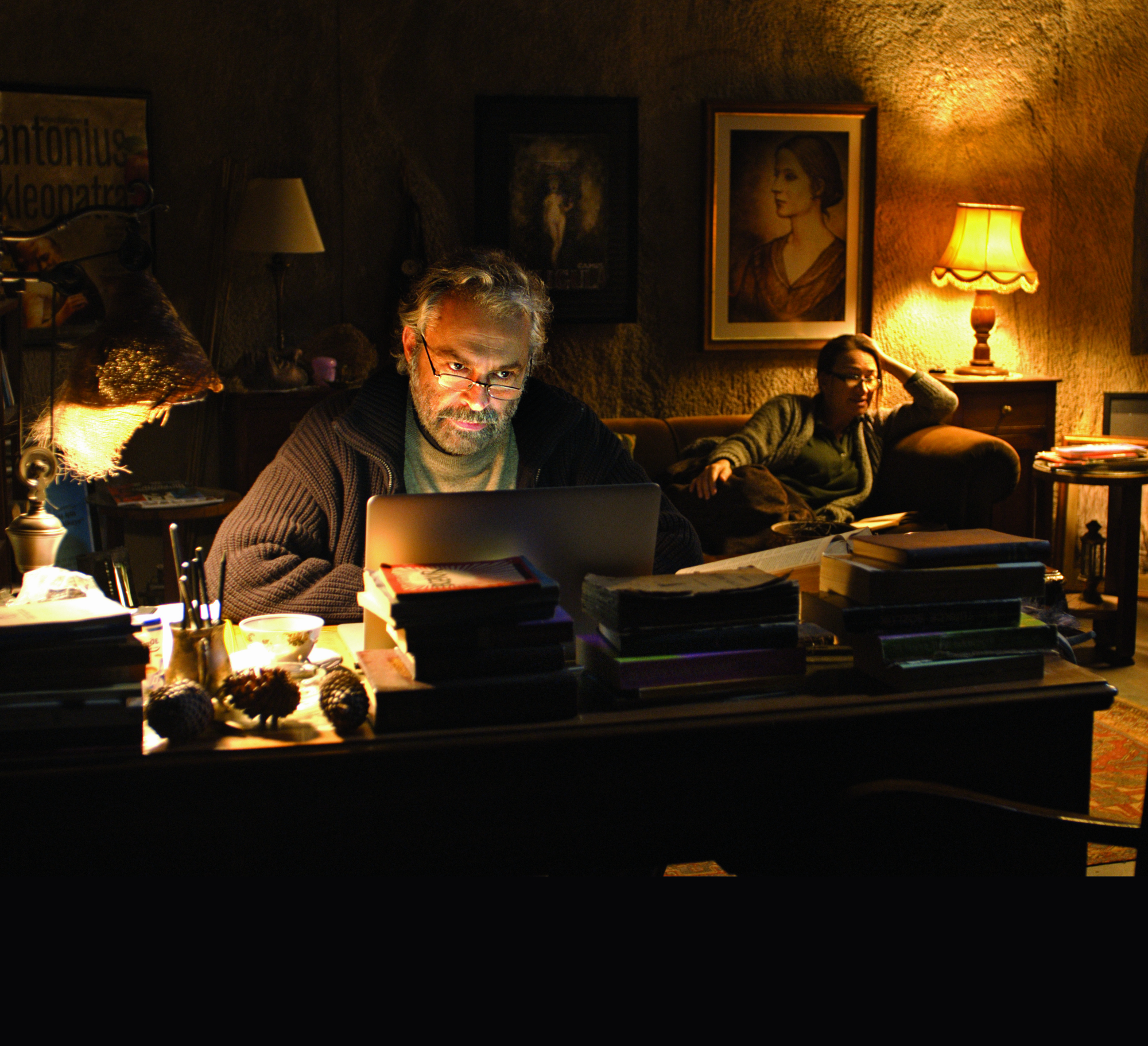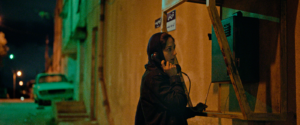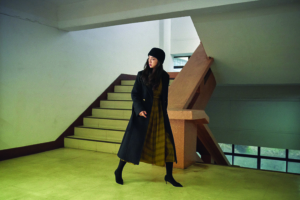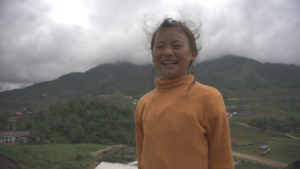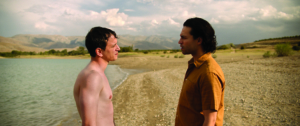It seems fitting that Nuri Bilge Ceylan’s Winter Sleep won the most coveted prize at the Cannes Film Festival in 2014. The hotly tipped Palme d’Or win coincided with the centennial year of filmmaking in Turkey, and Ceylan is the most prominent member of the Turkish new wave, which has helped to energise a resurgent Turkish film industry. Ceylan’s work in particular resonates with art-film and world-cinema audiences and critics, who admire his rigorous and often offbeat examinations of the male psyche. With Winter Sleep, he formally cements his reputation as one of the most important and distinctive auteurs working in international cinema.
Winter Sleep is an elegantly lucid film that, unsurprisingly, has topped many critics’ and film commentators’ ‘Best of 2014’ lists.[1]See, for example, the contributions by Geoff Andrew, Tom Charity and Maria Delgado in ‘The Year in Review’, Sight & Sound, vol. 25, no. 1, January 2015, pp. 39–40. Richly textured and unashamedly intellectual, the film is driven by lengthy, extended sequences of conversation in which philosophical arguments or caustic verbal jousting take precedence over narrative or plot development. The film is heavily inflected with theatrical and literary allusions – William Shakespeare, Anton Chekhov and Fyodor Dostoevsky all inform the claustrophobic architecture of Winter Sleep’s brooding film form. Also present is an emphasis on complexity and ambiguity – the film maintains a cool distance from its characters and their frequently hostile interactions.
At the heart of these spiky exchanges is protagonist Aydin (Haluk Bilginer), the owner of the small establishment Hotel Othello in Cappadocia, Central Anatolia’s breathtaking tourist ‘honey pot’. A former actor, the dominant and imperious Aydin lives with his considerably younger wife, Nihal (Melisa Sözen), and his divorced sister, Necla (Demet Akba˘g), and fancies himself as a benevolent father figure warmly presiding over both home and business. He also considers himself a thespian intellectual, smugly announcing to a young foreign visitor that he will write ‘a serious, thick book’ on the history of Turkish theatre. Elsewhere in the film, he boasts that he ‘never had to do soaps’, and delights in reliving the brief moment he spent with Egyptian actor Omar Sharif (a signed photograph of the pair dominates hotel reception).

When the winter snow sets in, the hotel goes into seasonal hibernation – allowing long-festering familial tensions to brew over in the suffocating atmosphere. Meanwhile, outside hostilities start to mirror the fractured domestic space, after a disenfranchised local boy (Emirhan Doruktutan) throws a rock at Aydin’s car window; the boy’s father, Ismail (Nejat ˙I¸sler), is a poor tenant of Aydin’s and is struggling to pay rent. This act of frustrated aggression sets off an elliptical chain of ethical inquiry that eventually turns back in on itself, ending in a return to stasis.
French New Wave director and film critic Jacques Rivette has written that ‘[a]ll films are about the theatre, there is no other subject’,[2]Jacques Rivette, quoted in Mary M Wiles, Jacques Rivette, University of Illinois Press, Chicago, 2012, p. 7. and this reminds us of the interdisciplinary reality of cinema. Rivette foregrounded this notion both in his own work and in his writings about film, contending that cinema
is an impure art, complex, between the novel, the theater, painting, music, dance, etc., and it is understandable that in this indeterminate place from within the middle of the traditional arts, that we would want to look sometimes in this direction, or in that direction.[3]ibid., p. 30.
Taking up Rivette’s language, Winter Sleep engages a theatrical framework that wants to ‘look sometimes’ in the direction of cinema, but simultaneously resists employing many of the formal or stylistic techniques usually used to orient us within the film’s diegesis. Whereas cinematic texts often use film’s unique technical apparatus to help unify the narrative into a cohesive story, Ceylan privileges a theatrical ‘staginess’; this sort of filmmaking doesn’t draw attention to itself, but instead invites us to watch in a way that recalls sitting in a theatre. The most obvious example of this is the use of a static camera in many scenes, which emphasises observation without any delineated identification figures. Also notably absent is the narrative arc that rewards the spectator with a denouement conveyed via cinema’s unique technical and aesthetic vocabulary (music to cue a key narrative revelation, or a camera tracking away from a character to emphasise sudden loss or recognition, for example).
Aydin’s fragile ego is also implicated in this merging of forms: he invites the outside world (and the viewer) into Hotel Othello, where the public and private are effectively collapsed, yet all is ‘enacted’ or staged within the fire-lit theatre that is the warren of rooms he presides over. In this space, the wordy intercessions of idea-driven dialogue register as out of sync with the power of the image that is being held in check. Like Aydin, Winter Sleep is in some ways out of step with its own form; its emphasis on theatricality is almost ‘anti-cinematic’, and it locates itself at an unconventional juncture somewhere between theatre, film and literature. Overall, Winter Sleep encourages this tension, which helps to convey the claustrophobic inertia of Aydin’s resistance to change and depict the frustrating stagnation that is born of his self-delusion.
The film cuts across theatrical and cinematic conventions to create its own unique measure of time. Here, time has its own internal logic whereby contemplation and observation are privileged over action and movement.
Ceylan calls his film’s emphasis on heavy dialogue ‘a big risk’. He concedes that
most of the time such dialogue doesn’t really work in cinema, where we’re more used to hearing the language of the streets […] I wanted to have the freedom to use another kind of language, such as you might find, for instance, in a novel. Now that may not be the language of the streets, but you do find it in real life, especially when educated people who consider themselves intellectuals get together.[4]Nuri Bilge Ceylan, quoted in Geoff Andrew, ‘Conversation Piece’, Sight & Sound, vol. 24, no. 12, December 2014, p. 33.
By locating Aydin within this bourgeois, educated social context, and privileging dialogue and a theatrical register, Ceylan allows us to soon glimpse the crown slipping from Aydin’s indulgent conceit; is he closer to a malicious fiend than the kindly king that his ego perceives him to be? Through the theatrical mise en scène and discreet camera work, which preserve an ambivalent, critical distance, we then begin to notice the increasingly yawning spaces between perception and reality. Interestingly, Ceylan identifies with Aydin’s character, and sees self-deception as central to the psyches of his characters and to the dynamics of their relationships:
they all still deceive each other, and themselves […] Of course, in real life we find that both necessary and useful. But in cinema it’s important to face up to the truth and show what’s really going on. That, for me, is one of the aims of art.[5]ibid.
Aydin’s self-conscious positioning of himself as a man of words and of the theatre creates moments of pathos and unexpected bursts of wryly observed humour. He is a tragicomic character whose Shakespearian ‘fatal flaw’ is the arrogance associated with an overweening masculine pride. Ensconced in his comfortable surroundings, he wields language like a weapon, always desperate to have the final word. Ultimately, he seems unable to face up to the truth of his life: Aydin’s disappointment and regret over reaching the winter of his life’s journey, and not feeling successful on his own terms, is constantly being displaced by pompous self-aggrandisement. But, while he does a lot of talking, his preferred mode of conduct is always passive-aggressive. Notably, he happily defers to his employee Hidayet (Ayberk Pekcan) when rent needs to be collected from poor families in the village. This avoidance of taking responsibility is established early on: Aydin watches sheepishly from behind the safety of a crumbling fence (he later writes derisively about the state of this property in the local paper) while Hidayet confronts Ismail about the rock his son has just thrown at Aydin’s car window.
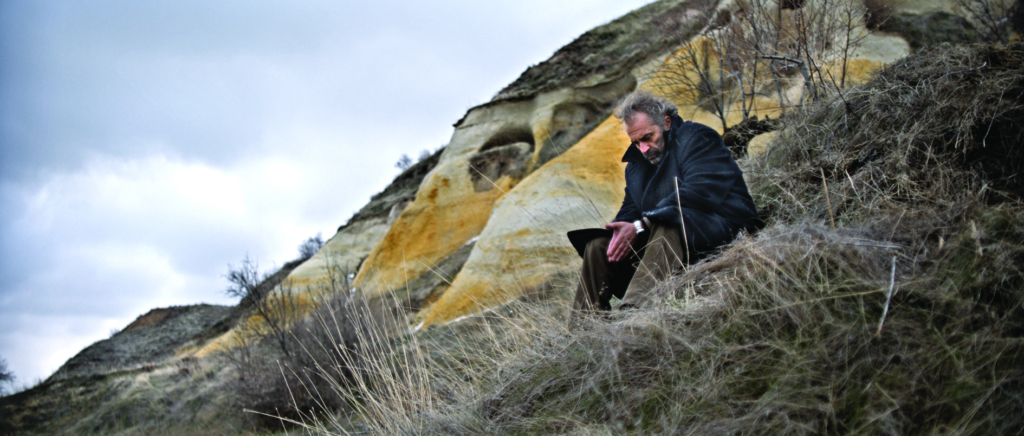
Recalling the title’s suggestion of both hibernation and stasis, Aydin is physically and metaphorically removed from the other people in his life – not just his poor tenants, but also his unhappy wife. Nihal is full of frustrated derision – ‘You are an unbearable man: selfish, spiteful and cynical’ – but Aydin’s response is merely a smug, indulgent smile. She is a foolish child to his far-reaching experience, and he quickly assures her that she knows nothing of the ways of the world. Their ruptured relationship comes to signify the broader spectrum of sociopolitical division, the ‘haves’ and the ‘have-nots’ trapped in a hermetic power dynamic that is just as resistant to change as Aydin’s wilful pride: ‘My kingdom may be small, but at least I am a king,’ he surmises.
The quiet build-up of dramatic tension strongly echoes the work of Chekhov, and film critic Mark Kermode calls the effect one of ‘widescreen claustrophobia’.[6]Mark Kermode, ‘Winter Sleep Review – a Powerful Meditation upon Guilt’, The Guardian, 23 November 2014, <http://www.theguardian.com/film/2014/nov/23/winter-sleep-review-powerful-meditation-guilt-nuri-bilge-ceylan>, accessed 18 February 2015. Shot / reverse shot technique and naturalistic lighting, combined with diegetic sound and lengthy scenes, create an internal sense of temporality that mimics the experience of real time. This effect is emphasised further by the photographic quality that Ceylan brings to framing, editing and the carefully balanced composition of his mise en scène. Sarinah Masukor notes that this static picture quality in Ceylan’s work helps regulate a ‘rhythm of the other aspects of everydayness – talking, driving, waiting, watching television – all of which have a sense of time that is antithetical to classical film time’.[7]Sarinah Masukor, ‘The Album of Everyday Life: The Photograph in the Films of Nuri Bilge Ceylan’, Screening the Past, 7 November 2010, <http://tlweb.latrobe.edu.au/humanities/screeningthepast/29/photograph-films-nuri-bilge-ceylan.html>, accessed 18 February 2015. This sense is particularly resonant in Winter Sleep, perhaps because the film cuts across theatrical and cinematic conventions to create its own unique measure of time. Here, time has its own internal logic whereby contemplation and observation are privileged over action and movement.
Towards the end of Winter Sleep, during a drunken fireside conversation in which Aydin is accused of failing in his social responsibility to look after his poor tenants, the following lines from King Richard III are quoted by the philanthropic school teacher Levent (Nadir Sarıbacak):
Conscience is but a word that cowards use,
Devised at first to keep the strong in awe:
Our strong arms be our conscience, swords our law.[8]William Shakespeare, King Richard III, 1593, available on Project Gutenberg, <http://www.gutenberg.org/cache/epub/1103/pg1103.html>, accessed 18 February 2015.
In this passage, Shakespeare suggests that conscience is a construct for the benefit of the affluent – a luxury for those who wield the power that gives rise to the imperative of regret in the first place. The poor have only action, whereas the wealthy have endless (fireside) dialectical conversations, such as this one in which the very notion of conscience is being scrutinised by Aydin and his companions.
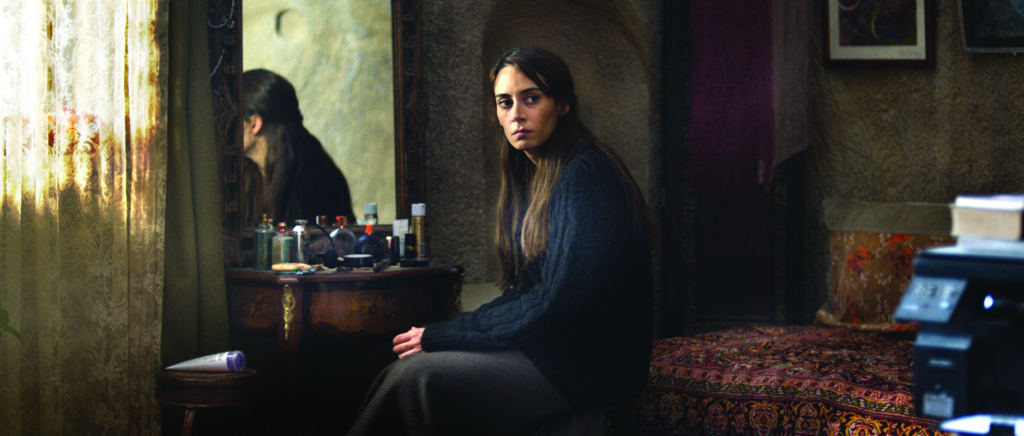
In Winter Sleep, fires emerge as a leitmotif, even when they are merely appropriated for their moody cinematic affect, and this collapses the literary, theatrical and filmic elements ambitiously juggled by Ceylan. The symbolic resonances of fireplaces and fireside gatherings become a driving trope that informs the film’s aesthetic framework; inquiry and interrogation are balanced by an awareness of the fragility of the human condition, with fires able to both sustain life and take it away. The authentic, unregulated atmosphere of a rural and isolated Turkish location is powerfully turned outwards via the symbolic associations of campfires, storytelling, invention and revelation. A succession of rambling fireside confrontations and tetchy, wandering conversations come to be charged with a far wider-ranging and less geographically located significance. The symbolism of fire even underscores what is perhaps the film’s most pressing thematic concern: the connection between the powerful and the powerless – and, by extension, the notion of social responsibility. Aydin’s pontification is like an interior campfire performance – or like shadow play enabled by the fire – that amounts to self-deception, though his intellectual pretensions are eventually circumvented by the desperate act of a powerless man. After discovering that Ismail’s brother (Serhat Kılıç) is the sole provider for a family of four, Nihal decides to override her husband and assist them with a considerable sum of Aydin’s money. She storms out into the snow-capped landscape towards Ismail’s home, but, recalling Aydin’s own masculine pride, Ismail is enraged by the offer and burns the money in his family’s hearth. The ghost of Dostoevsky lurks in the background of this cataclysmic event: the author’s engagement with the politics of poverty resonates in what amounts to the most potent scene in Winter Sleep’s 196 minutes. Perhaps most tellingly, this is one of the only instances in which dialogue is relegated to the background. While Aydin’s status has afforded him passivity, the powerless – such as Ismail – are limited to action. Instead of ideas and words, the crackling of the fire as the money burns is all that Ismail has.
The habitual presence of fire in the film hints at the proximity between the upwardly mobile members of the chattering classes, and the poor souls trying to warm themselves just to stay alive. Aydin’s conceited grandstanding is eclipsed by Ismail’s desperate rage, and the former’s ultimate failure to see the world through a lens other than his own is poignantly tragic. Winter Sleep is a magnificently quiet epic that both moves and amuses; the glacial relationships and marooned characters, all shuddering under the dark weight of self-deception, linger long after the audience has left the cinema.
Endnotes
| 1 | See, for example, the contributions by Geoff Andrew, Tom Charity and Maria Delgado in ‘The Year in Review’, Sight & Sound, vol. 25, no. 1, January 2015, pp. 39–40. |
|---|---|
| 2 | Jacques Rivette, quoted in Mary M Wiles, Jacques Rivette, University of Illinois Press, Chicago, 2012, p. 7. |
| 3 | ibid., p. 30. |
| 4 | Nuri Bilge Ceylan, quoted in Geoff Andrew, ‘Conversation Piece’, Sight & Sound, vol. 24, no. 12, December 2014, p. 33. |
| 5 | ibid. |
| 6 | Mark Kermode, ‘Winter Sleep Review – a Powerful Meditation upon Guilt’, The Guardian, 23 November 2014, <http://www.theguardian.com/film/2014/nov/23/winter-sleep-review-powerful-meditation-guilt-nuri-bilge-ceylan>, accessed 18 February 2015. |
| 7 | Sarinah Masukor, ‘The Album of Everyday Life: The Photograph in the Films of Nuri Bilge Ceylan’, Screening the Past, 7 November 2010, <http://tlweb.latrobe.edu.au/humanities/screeningthepast/29/photograph-films-nuri-bilge-ceylan.html>, accessed 18 February 2015. |
| 8 | William Shakespeare, King Richard III, 1593, available on Project Gutenberg, <http://www.gutenberg.org/cache/epub/1103/pg1103.html>, accessed 18 February 2015. |
